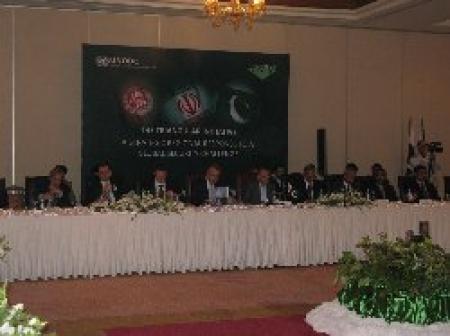ID :
151369
Sat, 11/27/2010 - 15:15
Auther :
Shortlink :
http://m.oananews.org//node/151369
The shortlink copeid
Regional moot vows to counter drug trafficking

Islamabad, Nov 27, IRNA -- Anti-narcotics ministers of Afghanistan, Iran and Pakistan on Thursday stressed the importance of enhanced regional and international cooperation to counter trafficking of drugs.
The ministers, who met in Islamabad, issued a declaration at the conclusion of two-day meeting recommending increased cooperation focused on reducing the demand for illicit drugs.
The Minister of Counter Narcotics of Afghanistan, Zarar Ahmad Moqbel Osmani, the Secretary-General of the Drug Control Headquarters of Iran, Eng. Mostafa Mohammad Najjar, and the Federal Minister for Narcotics Control, Arbab Muhammad Zahir as well as Executive Director of the United Nations Office on Drugs and Crime (UNODC), Mr Yury Fedotov, attended the meeting.
The participants agreed to establish cross-border communications through satellite phones (Thuraya compatible), GSM mobile phones, land line phones and fax machines between Pakistan and Iran and between Iran and Afghanistan.
In case of communications between Pakistan and Afghanistan it was agreed that amongst other means of communication, VHF and HF radio sets will also be used.
The ministers speaking at a joint press said there was a complete consensus and strong will to continue the simultaneous patrolling / operations amongst the three countries.
The meeting recommended expansion of number of Border Liaison Officers (BLOs) along the Pak-Afghan border in different provinces, in subject to the success of the pilot BLOs, as has been endorsed in the earlier meetings.
The BLOs should be provided with advanced technical equipment for swift and timely sharing of information, according to a recommendation.
All three countries must have a clear operational plan before expanding the BLO site.
The ministers asked to play a key role in capacity building, transfer of knowledge and sharing of expertise.
'UNODC should continue to play an advocacy role vis-à-vis the international community, reflecting progress made and results achieved by the three countries in the framework of the Triangular Initiative” the conference recommended.
The conference said that focus of the Joint Planning Cell (JPC) should remain on sharing of mutually relevant drug-intelligence and information between the three countries./end
The ministers, who met in Islamabad, issued a declaration at the conclusion of two-day meeting recommending increased cooperation focused on reducing the demand for illicit drugs.
The Minister of Counter Narcotics of Afghanistan, Zarar Ahmad Moqbel Osmani, the Secretary-General of the Drug Control Headquarters of Iran, Eng. Mostafa Mohammad Najjar, and the Federal Minister for Narcotics Control, Arbab Muhammad Zahir as well as Executive Director of the United Nations Office on Drugs and Crime (UNODC), Mr Yury Fedotov, attended the meeting.
The participants agreed to establish cross-border communications through satellite phones (Thuraya compatible), GSM mobile phones, land line phones and fax machines between Pakistan and Iran and between Iran and Afghanistan.
In case of communications between Pakistan and Afghanistan it was agreed that amongst other means of communication, VHF and HF radio sets will also be used.
The ministers speaking at a joint press said there was a complete consensus and strong will to continue the simultaneous patrolling / operations amongst the three countries.
The meeting recommended expansion of number of Border Liaison Officers (BLOs) along the Pak-Afghan border in different provinces, in subject to the success of the pilot BLOs, as has been endorsed in the earlier meetings.
The BLOs should be provided with advanced technical equipment for swift and timely sharing of information, according to a recommendation.
All three countries must have a clear operational plan before expanding the BLO site.
The ministers asked to play a key role in capacity building, transfer of knowledge and sharing of expertise.
'UNODC should continue to play an advocacy role vis-à-vis the international community, reflecting progress made and results achieved by the three countries in the framework of the Triangular Initiative” the conference recommended.
The conference said that focus of the Joint Planning Cell (JPC) should remain on sharing of mutually relevant drug-intelligence and information between the three countries./end





